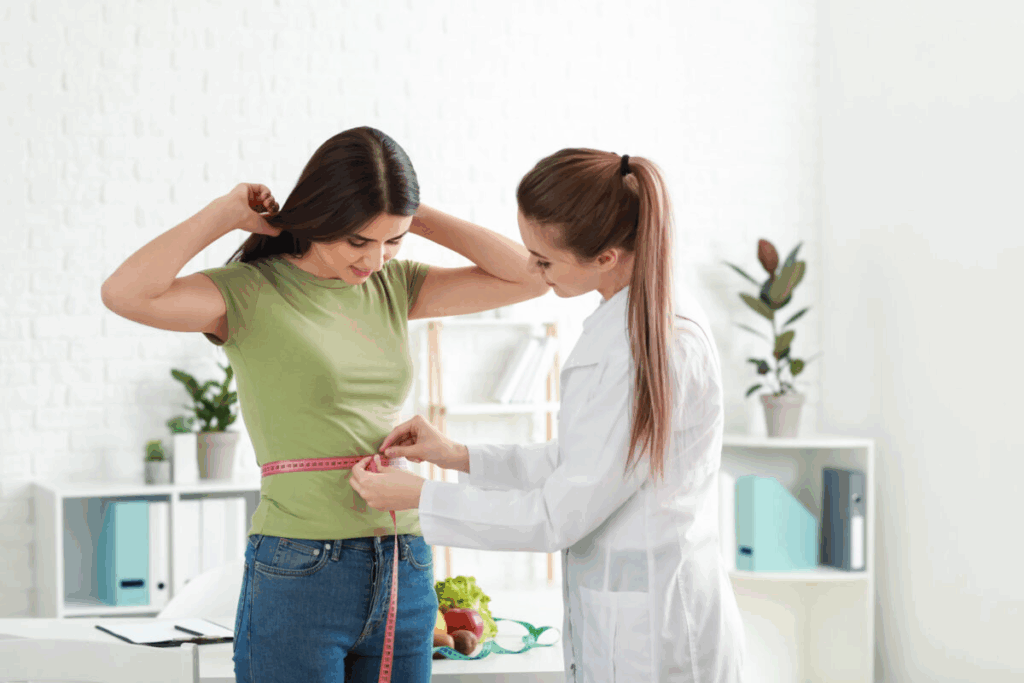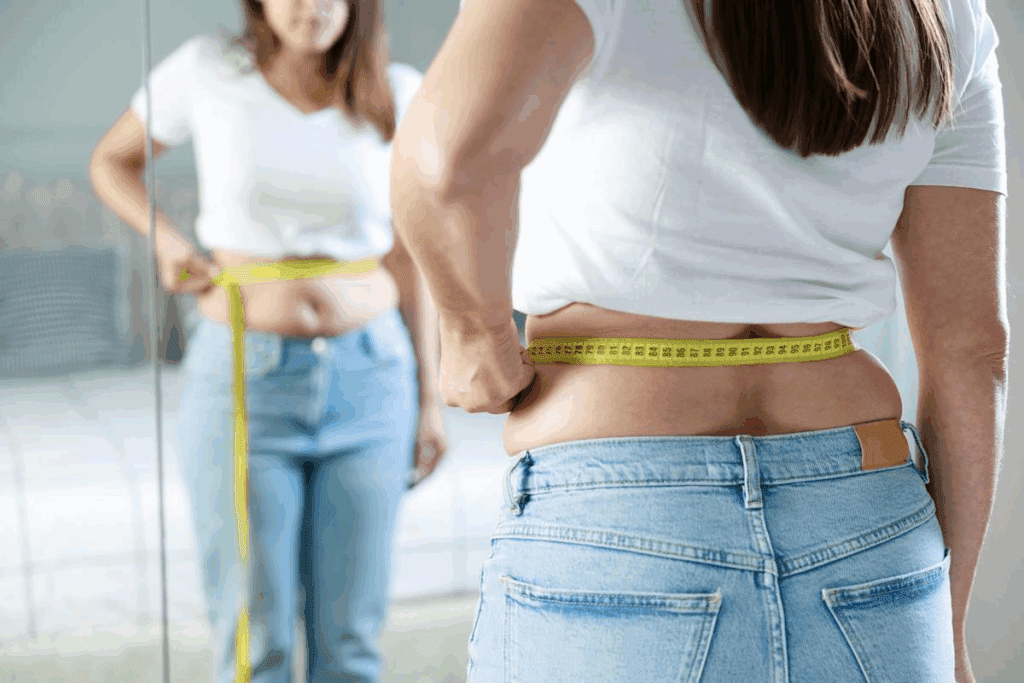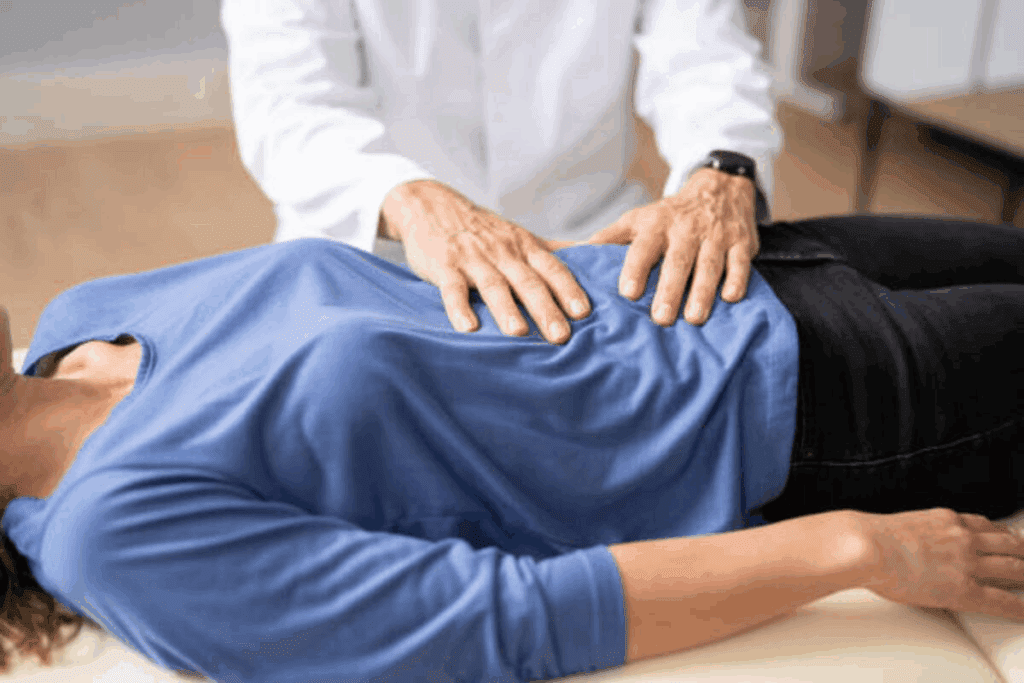Last Updated on November 26, 2025 by Bilal Hasdemir

The gallbladder is key in digestion. It stores and concentrates bile, aiding in fat processing. After it’s gone, many wonder if they’ll see weight changes. At Liv Hospital, we get it. We know you’re worried about gallbladder removal and how it affects weight.
Removing the gallbladder can change how you digest food and absorb nutrients.do you lose weight after gallbladder surgeryAnemia and Weight Loss: How They’re Connected and the Underlying Factors Explained This might affect your weight management. It’s important to understand the gallbladder’s role and what happens when it’s removed. This helps set clear expectations about weight changes after surgery.

The gallbladder is a small organ under the liver. It stores bile that helps digest fats. Bile, made by the liver, breaks down fats in the small intestine. This is key for absorbing fat-soluble vitamins.
A healthy gallbladder stores and concentrates bile. It releases bile into the small intestine during meals, mainly with fatty foods. This is vital for fat digestion and vitamin absorption.
The gallbladder’s role is often seen as auxiliary. Even without it, the liver can produce bile. But, not having a gallbladder can change how bile is released. This might affect digestion.
Gallstones are hardened deposits in the gallbladder, often made of cholesterol or bilirubin. They form due to bile imbalance, causing cholesterol to crystallize. Gallstones can block bile ducts, causing pain and other issues.
Gallstones can block bile flow, affecting digestion. This can cause abdominal pain, nausea, and vomiting, worse after fatty meals.
Symptoms like recurrent abdominal pain, nausea, vomiting, and jaundice often lead to gallbladder removal. These signs show the gallbladder isn’t working right, often because of gallstones.
If these symptoms keep happening and are linked to gallbladder disease, removing the gallbladder is often suggested. Knowing these symptoms helps patients make better treatment choices.

Gallbladder removal, also known as cholecystectomy, is a surgery for gallbladder problems. It’s often needed for gallstones or cholecystitis.
There are two main ways to do cholecystectomy: laparoscopic and open surgery. Laparoscopic surgery uses small cuts in the belly. It leads to less pain and quicker healing than open surgery.
Open surgery needs a bigger cut to remove the gallbladder. It’s more invasive but might be needed for severe cases.
Recovery time varies based on the surgery and the person. Laparoscopic surgery patients usually recover in 1-2 weeks. Open surgery patients might take 4-6 weeks.
After surgery, patients need to follow a special diet. A low-fat diet is recommended to ease discomfort. Avoid fatty, greasy, or spicy foods and eat small, frequent meals.
As you get better, you can slowly add more foods to your diet. Some people might need to stay on a low-fat diet for a long time.
| Food Type | Recommended | Avoid |
| Fats | Lean proteins, low-fat dairy | Fatty meats, fried foods |
| Fruits and Vegetables | Most fruits and vegetables | High-fiber foods initially |
Many people wonder if losing their gallbladder leads to weight loss. This question is worth exploring. The link between gallbladder removal and weight change is complex. It depends on diet and digestion changes.
Right after gallbladder surgery, patients often see weight changes. These changes come from several sources:
It’s key to remember these early weight changes don’t always mean long-term weight loss or gain.
It’s important to tell apart fat loss and fluid loss after surgery. Fluid loss happens due to less fluid retention or diet changes. Fat loss is tied to metabolism and fat digestion changes.
Initial weight loss is often from fluid loss. This might not last long term.
Removing the gallbladder causes temporary digestive issues. These can include diarrhea or trouble absorbing fats. These issues can affect weight in different ways:
Knowing about these changes helps patients set realistic goals. It also guides them in making the right diet changes.
Studies have shown that cholecystectomy’s effect on weight loss varies. The medical field is trying to understand how removing the gallbladder impacts weight management.
Many studies have looked into weight changes after cholecystectomy. Some patients lose weight, while others gain or see no change.
A study in the Journal of Gastrointestinal Surgery found that surgery can alter digestion. This can affect weight.
Key Findings from Clinical Research:
The gallbladder helps digest fats by storing bile from the liver. Without it, bile goes straight to the small intestine. This can change how fats are absorbed.
This change might affect how the body processes fats. It could influence weight loss or gain.
Several things can affect weight loss after gallbladder surgery. These include:
| Factor | Influence on Weight Loss |
| Dietary Changes | Adjustments in fat intake can significantly impact weight |
| Metabolic Rate | Changes in metabolism post-surgery can affect weight loss |
| Physical Activity | Level of exercise and physical activity influences weight management |
Knowing these factors is key to managing weight after cholecystectomy.
Understanding the long-term effects of gallbladder removal on weight requires examining metabolic adaptations and individual responses. The removal of the gallbladder, known as cholecystectomy, significantly alters the body’s digestive processes.
After gallbladder removal, the body undergoes several metabolic adaptations. The liver continues to produce bile, but it directly flows into the small intestine. This changes the timing and manner of fat digestion.
Over time, the body may adapt to these changes. But the efficiency of fat absorption can be affected.
Research suggests that these adaptations can lead to variations in weight loss outcomes among individuals. Some people may experience weight loss due to reduced fat absorption, while others may not see significant changes.
Individual responses to gallbladder removal can vary widely. Factors such as diet, lifestyle, and overall health can influence weight changes post-surgery. For instance, individuals who adopt a low-fat diet may experience different weight loss outcomes compared to those who consume higher amounts of fat.
These factors contribute to the complexity of predicting weight loss outcomes after cholecystectomy.
It’s essential to have realistic expectations regarding weight loss after gallbladder removal. While some individuals may experience weight loss, it is not a guaranteed outcome for everyone. A balanced approach to weight management, including diet and exercise, is key.
Consulting with healthcare professionals can provide personalized guidance on managing weight post-surgery. By understanding the possible metabolic adaptations and individual variations, individuals can better navigate their weight loss journey after gallbladder removal.
After gallbladder surgery, people might feel uncomfortable and struggle with weight. The lack of a gallbladder changes how bile moves through the body. This can affect digestion and weight management.
Diarrhea is a common problem after gallbladder surgery. Without a gallbladder, bile salts can irritate the intestines. This leads to diarrhea. To handle this, try:
Keeping a food diary helps track which foods cause problems. Talking to a healthcare provider for advice is also helpful.
Without a gallbladder, the body may not absorb fats well. This can cause symptoms like diarrhea, bloating, and gas. To manage this:
A healthcare provider can help find the best way to handle fat malabsorption.
Weight changes after gallbladder surgery can vary. Some might lose weight because they absorb less fat. Others might gain weight if they eat more calories than they burn.
A study in the Journal of Gastrointestinal Surgery found that weight changes depend on diet and health conditions.
“Weight changes after gallbladder removal are multifactorial and can be influenced by changes in dietary habits, metabolic adaptations, and individual variability in response to the surgery.”
Journal of Gastrointestinal Surgery
| Symptom | Potential Impact on Weight | Management Strategy |
| Diarrhea | Potential weight loss due to malabsorption | Dietary adjustments, medication |
| Fat Malabsorption | Weight loss or nutritional deficiencies | Supplements, dietary changes |
| Increased Hunger | Potential weight gain | Meal planning, portion control |
Managing symptoms well is key to keeping a healthy weight after gallbladder surgery. Understanding the effects and using the right strategies helps individuals deal with the challenges of gallbladder removal.
After having your gallbladder removed, it’s key to eat right to manage your weight. Without a gallbladder, your body can’t digest fats as well. So, changing what you eat is important for staying healthy and keeping your digestive system working right.
Experts often suggest a low-fat diet for those without a gallbladder. This means cutting down on foods high in fat like fried foods, fatty meats, and creamy sauces. Instead, choose lean proteins like chicken, fish, and plant-based foods. Adding more fruits, veggies, and whole grains to your meals can also help with weight control and digestion.
Key components of a low-fat diet include:
Managing your weight without a gallbladder means paying attention to when and how much you eat. Eating smaller meals more often can ease digestion. Also, eating slowly and with attention can help prevent overeating.
Tips for meal timing and portion control:
Some foods can make digestive problems worse after gallbladder removal. It’s best to limit or avoid foods high in fat, spicy foods, and anything that can cause gas and bloating. Common culprits include:
As you get used to not having a gallbladder, you can slowly add fats back into your diet. Start with small amounts of healthy fats like avocados, nuts, and olive oil. Watch how your body reacts and adjust as needed.
By following these dietary tips, you can manage your weight and stay healthy without a gallbladder. It’s all about finding a diet that fits your body and sticking to it.
Safe weight loss after gallbladder surgery means knowing what to eat and staying active. A good plan is key for those who have had their gallbladder removed. It helps them lose weight without harming their health.
Creating a lasting eating plan is key for weight control after gallbladder surgery. Focus on a low-fat diet full of nutrients. Eat foods high in fiber like fruits, veggies, and whole grains.
A study in the Journal of the Academy of Nutrition and Dietetics says, “A diet rich in fruits, vegetables, and whole grains can help manage weight and support overall health post-surgery.”
Exercise is important for weight loss and health after gallbladder surgery. But, start slowly during recovery.
| Recovery Stage | Recommended Activities |
| Immediate Post-Surgery (1-2 weeks) | Light walking, stretching |
| Early Recovery (2-4 weeks) | Short walks, light aerobic exercises |
| Advanced Recovery (4-6 weeks) | Brisk walking, swimming, cycling |
After gallbladder removal, fat digestion changes. It’s important to choose foods wisely.
Some people might not absorb fats well, leading to diarrhea. Limiting fat and eating easy-to-digest foods can help.
“A well-balanced diet that is tailored to the individual’s needs post-surgery can significantly improve nutritional outcomes and support weight management.”
Some supplements can help with digestion after gallbladder surgery. These include:
Always talk to a healthcare provider before taking supplements. Make sure they are safe and right for you.
Weight loss after gallbladder surgery can be tough. It’s affected by many factors, both physical and mental. People often have to change their lifestyle and eating habits to lose weight after surgery.
One big challenge is feeling hungrier than usual. Without a gallbladder, the body can’t control bile release well. This might lead to poor fat digestion and more hunger.
To tackle this, eating foods high in fiber and protein can help. These foods make you feel full longer. Also, eating smaller meals more often can help control hunger and improve digestion.
Another issue is irregular bowel movements. This can happen because of how bile moves to the intestines. It can change how often you go and what your stool looks like.
Staying hydrated and eating a balanced diet can help. Foods like fruits, veggies, and whole grains are good for regular bowel movements. Sometimes, taking psyllium husk supplements can help make stool firmer.
The mental side of losing weight after gallbladder surgery is important. Stress and emotional changes can mess with your eating habits and weight loss goals.
Doing things that reduce stress, like yoga or meditation, can help. Joining support groups online or in person can also be helpful. These groups connect you with others who have gone through similar things, making it easier to deal with the mental side of weight management.
Understanding and tackling these challenges can help patients manage weight loss after gallbladder surgery. This way, they can reach a healthier weight and feel better overall.
Knowing when to talk to your doctor about weight changes after gallbladder surgery is key. Some weight changes are normal, but others might mean there’s a problem.
After gallbladder removal, watch your body closely for signs of trouble. Look out for:
If you notice any of these, see your doctor right away.
Not every change after gallbladder surgery is a problem. Some are just your body adjusting. Normal changes might include mild digestive issues or small weight shifts. But, if symptoms are severe or don’t go away, it could be a sign of trouble.
“The key to a successful recovery is monitoring your body’s response and seeking medical advice when needed.” – Dr. Jane Smith, Gastroenterologist
| Symptom | Normal Adaptation | Potential Complication |
| Weight Loss | Mild weight loss due to dietary changes | Significant or rapid weight loss |
| Diarrhea | Occasional loose stools | Persistent or severe diarrhea |
| Abdominal Pain | Mild discomfort during recovery | Severe or worsening pain |
Regular check-ups are important after gallbladder surgery. They help your doctor keep an eye on your health and catch any problems early. Use these visits to talk about any worries or symptoms you have.
By staying informed and talking openly with your healthcare team, you can manage the post-surgery period well. This way, you can handle any weight-related issues effectively.
Keeping a healthy weight after gallbladder surgery needs a full plan. This includes changing your diet, making lifestyle changes, and getting ongoing medical care. People who have their gallbladder removed might see changes in their weight. But, how much weight they lose can vary a lot.
It’s important to know that losing weight after gallbladder surgery isn’t just about the surgery itself. How your body digests fat, your metabolism, and your lifestyle all matter. So, after gallbladder removal, do you lose weight? It depends on how well you adjust to digestive changes and manage your diet and exercise.
To manage weight well after surgery, eat a balanced diet, watch your portion sizes, and stay active. It’s also key to follow the diet advice from your healthcare team. Be ready for possible digestive issues like diarrhea or trouble absorbing fat.
In the end, being proactive and well-informed about managing your weight and health after gallbladder surgery can lead to a great recovery. It can also improve your overall quality of life.
Yes, removing your gallbladder can change how you digest food. This might affect your weight. How much it changes depends on your diet and health.
Losing weight after gallbladder removal is possible. But, you might need to change your diet and lifestyle. It’s important to know how to manage your weight without a gallbladder.
Losing weight after gallbladder surgery isn’t guaranteed. It can vary a lot from person to person. Some might lose weight, while others might not.
To lose weight after gallbladder surgery, start with a healthy eating plan. Include gentle exercise during recovery. Also, balance your nutrition well. Managing digestive symptoms and adjusting your diet is key.
Gallbladder removal itself doesn’t directly cause weight loss. But, changes in digestion and eating habits after surgery can affect your weight.
For weight management without a gallbladder, eat a low-fat diet. Pay attention to meal timing and portion control. Gradually adding fats back into your diet and avoiding certain foods can also help.
Long-term weight loss after gallbladder removal depends on many factors. These include metabolic changes and how your body responds to weight loss.
To manage digestive symptoms after gallbladder removal, deal with diarrhea and fat malabsorption. Adjusting your diet can help mitigate symptoms and support weight management.
If you notice warning signs of complications, significant weight changes, or persistent digestive issues, see your doctor. They can provide guidance and follow-up care.
Some supplements might help with digestion after gallbladder removal. But, always talk to your healthcare provider before adding any supplements to your routine.
Common challenges include increased hunger, irregular bowel movements, and the psychological aspects of managing weight after surgery.
For healthy weight management after gallbladder removal, take a holistic approach. This includes a balanced diet, regular exercise, and managing your digestive health.
Subscribe to our e-newsletter to stay informed about the latest innovations in the world of health and exclusive offers!